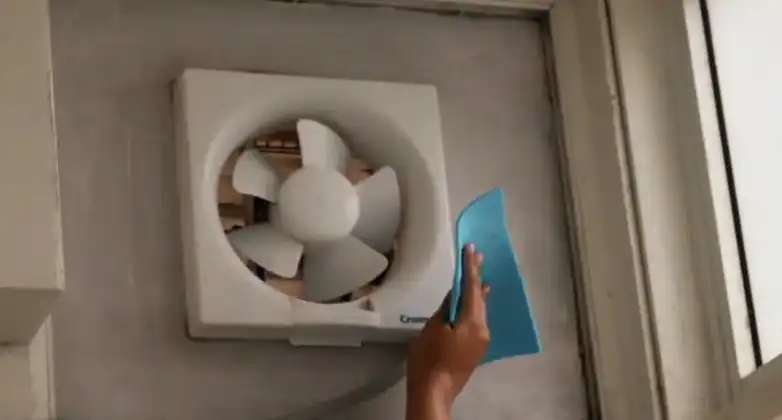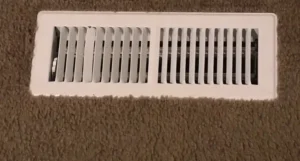Kitchen exhausts are a popular alternative to kitchen hoods, which can be quite costly. Moreover, a powerful enough exhaust fan which is properly placed, can be just as effective. However, they do require more frequent cleaning. Therefore, it’s important to learn how to clean the kitchen exhaust fan grease properly.
In this article, we will explain in a step-by-step manner, how you can clean the kitchen exhaust fan grease, what are its benefits as well as answer some relevant questions. So, read on.

How to Clean Kitchen Exhaust Fan Grease
Cleaning the kitchen exhaust fan is easy and doesn’t require using more than a few household tools. Here’s what you will need:
- Screwdriver
- Duct tape
- Bucket
- Warm soapy water
- Degreaser or ammonia
- Scrub brush or toothbrush
- Rubber gloves
- Cleaning cloths
- Newspaper or plastic sheets for protection
Safety Precautions
Cleaning your kitchen exhaust fan can be a messy and potentially hazardous task. Prioritize safety with these precautions:
Turn off the power: Ensure the exhaust fan is disconnected from the power source to prevent accidents.
Wear protective gear: Put on rubber gloves and protective eyewear to shield yourself from grease and cleaning agents.
Adequate ventilation: Open windows and doors or use fans to keep the kitchen well-ventilated while working with cleaning agents.
Cover countertops and appliances: Protect your kitchen surfaces with newspaper or plastic sheets to catch any falling grease or dirt.
Step-by-Step Cleaning Process
Follow these detailed steps to clean your kitchen exhaust fan thoroughly:
Step 1: Disconnect the Power
Turn off the power to the exhaust fan. Locate the circuit breaker or switch that controls the fan and turn it off to prevent any electrical accidents during cleaning.
Step 2: Remove the Fan Cover
Most exhaust fans have a removable cover held in place by screws. Use a screwdriver to carefully remove the screws, and gently take off the cover. Place the screws in a safe place to avoid losing them.
Step 3: Tape the Fan Blades
To prevent dirt and cleaning solutions from falling into the exhaust fan housing, cover the fan blades with duct tape. Ensure it is secure and won’t come loose during cleaning.
Step 4: Prepare Cleaning Solution
Fill a bucket with warm soapy water. You can also add a degreaser or ammonia to the water for extra cleaning power. Be sure to follow the manufacturer’s instructions when using any cleaning product.
Step 5: Soak the Cover
Submerge the fan cover in the soapy water solution. Let it soak for about 15-20 minutes to loosen the grease and grime.
Step 6: Scrub the Fan Cover
After soaking, use a scrub brush or toothbrush to gently scrub the fan cover. Pay special attention to areas with heavy grease buildup. Rinse the cover thoroughly with clean water and allow it to air dry.
Step 7: Clean the Exhaust Fan Housing
While the cover is drying, turn your attention to the exhaust fan housing. Use a cloth soaked in the soapy water solution or a degreaser to wipe down the interior of the housing. Be meticulous in removing all grease and dirt.
Step 8: Reassemble the Fan
Once the cover is dry and the housing is clean, remove the duct tape from the fan blades. Carefully reattach the fan cover by securing it with the screws you removed earlier.
Step 9: Restore Power
Finally, turn the power back on to your kitchen exhaust fan and ensure it is functioning correctly. You have successfully cleaned your kitchen exhaust fan.
When to Clean Your Kitchen Exhaust Fan
Knowing when it’s time to clean your kitchen exhaust fan is crucial for maintaining its efficiency and safety. Look out for these signs:
Reduced airflow: If you notice a decrease in the exhaust fan’s airflow, it may be due to grease buildup obstructing the fan blades or ductwork.
Visible grease accumulation: If you can see grease buildup on the fan cover or in the exhaust hood, it’s definitely time for a cleaning.
Unpleasant odors: Lingering cooking odors or a greasy smell in the kitchen, even when the exhaust fan is running, can indicate a need for cleaning.
Increased noise: A noisy exhaust fan can be a result of grease accumulation interfering with the fan’s operation.
Frequency of Cleaning
The frequency of cleaning your kitchen exhaust fan depends on your cooking habits and the type of cooking you do. In general:
Light cooking: If you rarely use your kitchen for cooking and mostly prepare simple meals, you can clean the exhaust fan once or twice a year.
Regular cooking: For daily or frequent cooking that involves frying or grilling, clean the exhaust fan every three to six months.
Heavy cooking: If you frequently cook high-grease dishes or have a commercial kitchen, clean the exhaust fan every one to three months.
Benefits of Regularly Cleaning Your Kitchen Exhaust Fan
Cleaning your kitchen exhaust fan grease offers several important benefits:
Improved ventilation: A clean exhaust fan operates at its peak efficiency, effectively removing cooking odors, smoke, and airborne grease particles.
Fire prevention: Reducing grease buildup in the exhaust system lowers the risk of grease fires, which can be catastrophic in a kitchen.
Energy savings: A clean exhaust fan doesn’t have to work as hard, leading to energy savings and potentially extending the fan’s lifespan.
Enhanced indoor air quality: Regular cleaning helps maintain a healthier indoor environment by removing grease, dust, and contaminants from the air.
Frequently Asked Questions (FAQs)
Can I use a dishwasher to clean the fan cover?
No, it is not recommended to clean the fan cover in a dishwasher as the high water temperatures and harsh detergents can damage the finish or paint on the cover. Hand washing with warm soapy water is a safer option.
Can I use vinegar to clean the exhaust fan?
While vinegar can be effective for cleaning many kitchen surfaces, it may not be strong enough to remove heavy grease buildup. Using a commercial degreaser or ammonia-based cleaner is usually more effective.
Is it necessary to clean the exhaust fan housing every time I clean the cover?
Cleaning the exhaust fan housing every time you clean the cover is not necessary. However, it’s a good practice to inspect the interior regularly and clean it when you notice grease buildup.
Summing it Up
Maintaining a clean kitchen exhaust fan is essential for efficient ventilation, safety, and improved indoor air quality. By following the step-by-step cleaning process outlined in this guide, understanding when to clean, and recognizing the benefits of regular maintenance, you can ensure your kitchen exhaust fan operates at its best, creating a healthier and safer cooking environment. Don’t neglect this important task, and enjoy the benefits of a clean and well-functioning kitchen exhaust fan.

![Read more about the article [Explained] What Is the Temperature of the Kitchen Hood Exhaust?](https://kitchenhoodcare.com/wp-content/uploads/2023/03/What-Is-the-Temperature-of-the-Kitchen-Hood-Exhaust-300x161.webp)
![Read more about the article [4 Fixes] Why Won’t My Range Hood Fan Turn Off?](https://kitchenhoodcare.com/wp-content/uploads/2023/05/Why-Wont-My-Range-Hood-Fan-Turn-Off-300x161.webp)
